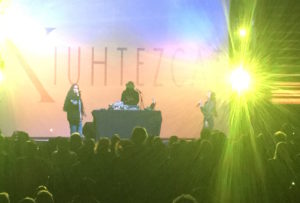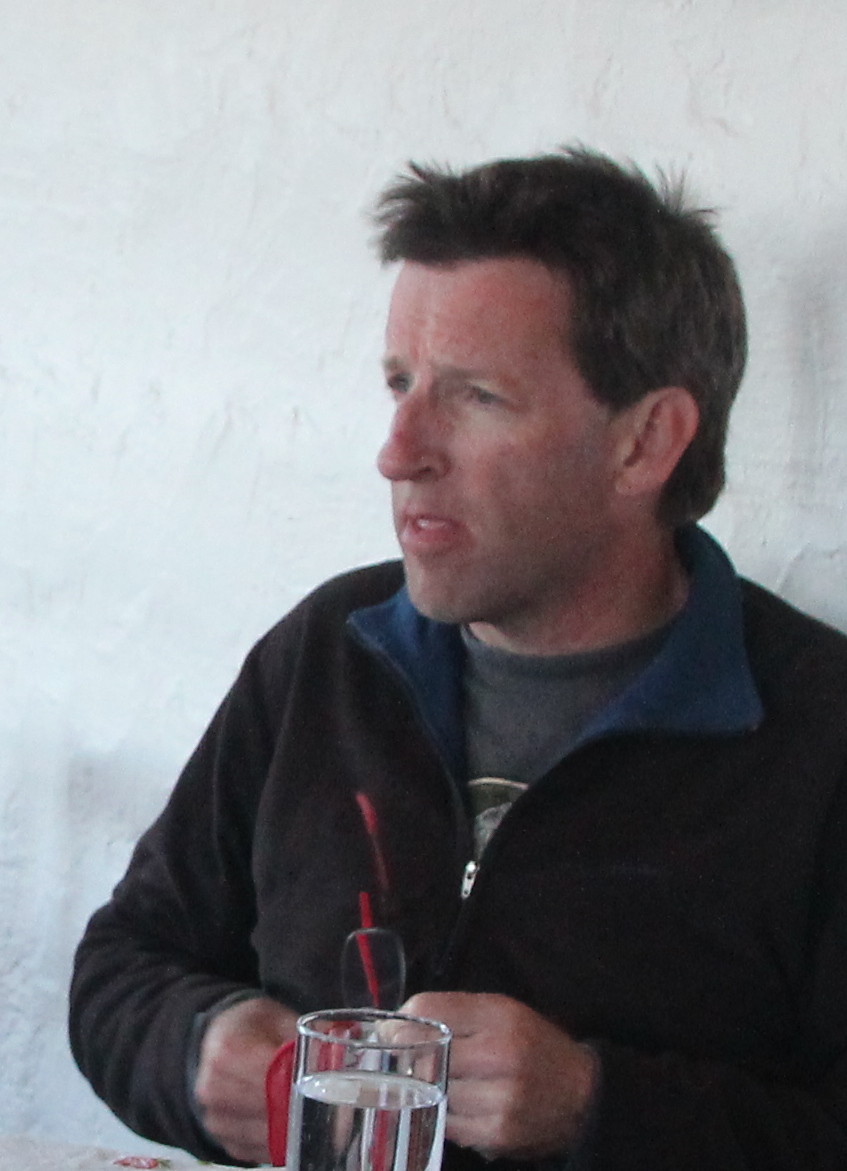 The hip-hop artist and climate activist Xiuhtezcatl Martinez was in Flagstaff late last week for an address at NAU’s Climate 2020 summit and an evening performance at the Orpheum Theater. He made it clear up front that the rules of engagement for the two events were not the same. “I need you all right in front, in the mosh pit!” he commanded the sitting audience at the Orpheum, and moments later a surging crowd ranging in age from middle school through college and, well, let’s just say somewhat older was dancing and fist-pumping and Instagram-posting to a pounding beat.
The hip-hop artist and climate activist Xiuhtezcatl Martinez was in Flagstaff late last week for an address at NAU’s Climate 2020 summit and an evening performance at the Orpheum Theater. He made it clear up front that the rules of engagement for the two events were not the same. “I need you all right in front, in the mosh pit!” he commanded the sitting audience at the Orpheum, and moments later a surging crowd ranging in age from middle school through college and, well, let’s just say somewhat older was dancing and fist-pumping and Instagram-posting to a pounding beat.
A thought came to me soon after: wow, Mom would not have liked this. Not that she had anything against music and dancing—she was quite a ballroom dancer in her youth, and a lifelong fan of music, mainly classical. But she never embraced the multiple streams of popular music that flowed through the country’s veins after the big-band era, finding them too loud, too incomprehensible.
Perhaps she would have enjoyed hearing singing in Spanish, though. Martinez, now 19, grew up mainly in Boulder, Colorado, but he has Mexican heritage, and sings in both Spanish and Nahuatl in addition to English. He has achieved a measure of fame both as a performing and recording artist and as one of the plaintiffs in Juliana vs. United States of America, a long-running lawsuit that charges the federal government with dereliction of duty to its own citizens because of its conscious failure to address climate change. Martinez is also a director of the activist organization Earth Guardians, which aims to harness youth energy to deal with the tightly linked problems of climate change and social justice.
My mom was in most regards an open-minded person. She admired dynamic young people, found it interesting to hear about what we and our friends liked and were up to. But as she aged she closed herself off from new possibilities. I always found it funny that her adoption of new technologies stopped somewhere around 1980. Answering machine: yes. Voicemail: no. Microwave oven: no. Personal computer: no. Cell phone: adopted only grudgingly at her children’s insistence, so that she could call for help when she was out driving somewhere.
The work of Earth Guardians is very much a cry for help, a full-throated grappling with the fact that climate change is here now and everywhere, that it is accelerating fast and that it is an existential threat to the generation now young. Martinez made this very clear during the talk he gave at the climate summit, pointing out that, if left unabated, climate change will dramatically constrain the possibilities young people have in the future. It was time, he said, for youth to take the lead in shaping responses to the issue, as he had done recently when he spoke before hundreds of thousands of largely young protestors in New York City along with the Swedish climate activist Greta Thunberg.
In the case of the car, too, older was comfortable for my mom. She’d bought a new VW shortly after my dad died, in her favorite green. More than 15 years later she was still using it to get to the supermarket, to lunch with her friends, to pick us up from the airport. As she progressed into her 80s, driving with her was increasingly alarming. The expressway traffic was hectic, her perceptions and reaction time noticeably slower.
The science of global warming has been quite clear for at least three decades: increased levels of greenhouse gases lead to higher temperatures and more energy in the atmosphere, which together lead to all sorts of alterations in precipitation, storm activity, ocean circulation and more, which in turn lead to disruptions in agricultural productivity, public health, wildfire behavior and nearly every other aspect of human life. But the pace of addressing the problem has been slow enough, or backwards enough, that half of all the carbon humans have ever emitted into the atmosphere has been put there in those last 30 years, even as decision-makers have had full access to what its consequences would be.
My sisters lived much closer. We talked it over. What do you think of her driving? Things are changing. Maybe she shouldn’t. But she lives in the suburbs. Without it she wouldn’t be able to buy groceries or presents for the grandkids, meet her friends, go to her exercise class. She’d be trapped.
Climate change, in other words, is very clearly the fault of the generations that are in power now, as we have ignored the problem even as we have learned more and more about it. And those generations have not shown themselves to be capable of rising to this challenge. This is not true only of the troglodytes in the Trump administration, who have chosen to respond to the knowledge that human civilization and the ecosystems on which it depends are headed over a cliff edge by pressing down harder on the accelerator. No, even countries administered in a much more enlightened way are having trouble responding to climate change with anything like the urgency needed.
The time came, without a decision on our part. The state of Illinois asked my mom to renew her driver’s license, and because she was over 80 an in-person test was required. She failed, three times, each occasion more frustrating than the last. A lifetime of freewheeling suburban driving was over. I didn’t tell her that I was relieved, as much because we’d avoided a difficult decision as because she and others on the road really were safer this way.
What was clear at the climate summit was that today’s young people are those who will be most affected by climate change. They are quickly coming to realize—in Juliana v. U.S., in climate strikes, in many other ways—that their elders will not do the saving for them. We might say what they are coming to realize is that things may soon get desperate enough that they need to take the keys away from the older generation. Sorry, I imagine them saying, but you are destroying our future. We won’t stand for it anymore. We’re taking over. That could happen in dark ways, and I wouldn’t blame them. It would be better if we could all agree on what needs to be done.
The old VW kept sitting in the garage. To sell it would have been too overt a sign of what was going on, an acknowledgement that the decline underway was irreversible. No, Mom was not going to sneak away for a jaunt to the supermarket. But she was also not willing to admit out loud she’d never drive again. And so the last part of her life began, the years—blessedly few in the end—of her radical dependence on her kids and other caregivers.
Martinez closed out his talk at the climate conference with talk about love. It was the only thing that can get us through climate change, he said: love of young people for their elders, for what the experienced can teach the new; love of elders for their descendants, a love profound enough to encompass profound sacrifices now.
Will the keys need to be taken away, forcefully? Let’s hope not—if we all have the wisdom to recognize, as parents so often have, that it is the needs of the young that should determine what happens.

